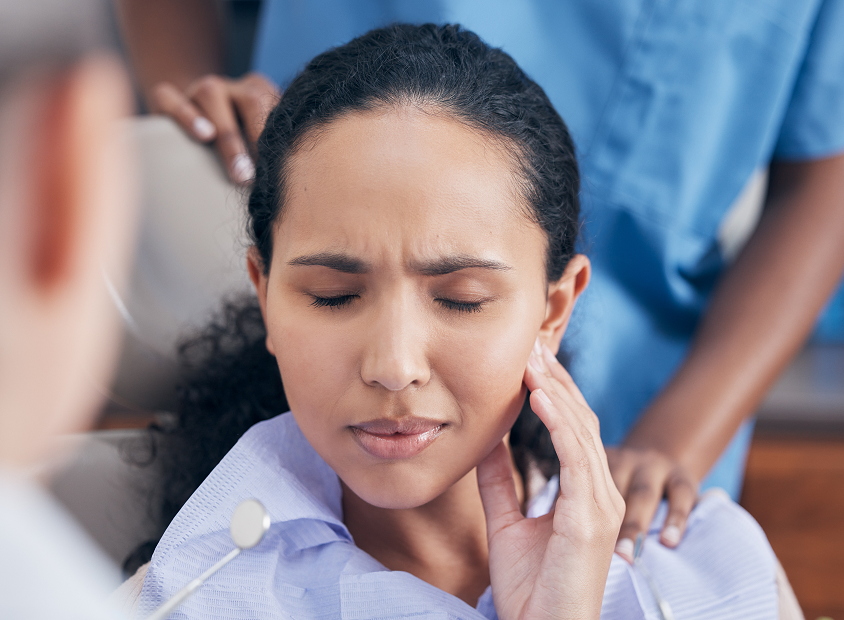
Dental emergencies can strike unexpectedly, often at the most inconvenient times. Knowing what to do in the heat of the moment can prevent pain from worsening, help you feel calm, and protect your smile. Here, we’ll cover the essentials for handling dental emergencies so you can take swift and confident action when it matters most.
What Counts as a Dental Emergency?
Not all dental issues require immediate attention, but some situations demand urgent care. Here’s a quick list of common dental emergencies:
- Severe Tooth Pain: Sharp, intense pain that doesn’t go away could signal a serious issue, such as an infection or exposed nerve.
- Broken or Cracked Tooth: A cracked or fractured tooth can lead to further damage or infection if not treated quickly.
- Knocked-Out Tooth: A tooth that’s completely out requires immediate attention; you may save it if you act fast.
- Bleeding Gums: Excessive bleeding, especially after an injury, should be addressed to prevent complications.
- Abscess or Infection: Swelling or visible pus around a tooth indicates infection, which can spread if untreated.
Steps to Take During Common Dental Emergencies
When a dental emergency hits, staying calm and acting quickly can make a big difference. In case you are unable to find a good emergency dentist in Riverside on time, here are steps to follow for some of the most frequent types of emergencies:
Severe Toothache Relief
If you’re struck by sudden tooth pain, it’s important to determine the cause quickly. While waiting for professional care:
- Rinse with Warm Salt Water: This helps reduce bacteria in your mouth, easing pain and soothing inflammation.
- Apply a Cold Compress: Place a cold pack outside the cheek near the painful area for 15-minute intervals.
- Take Over-the-Counter Pain Relievers: Ibuprofen or acetaminophen can provide temporary relief. Avoid placing aspirin directly on the tooth—it can irritate the gums.
Handling a Knocked-Out Tooth
A knocked-out tooth requires fast action to maximize the chance of saving it. Here’s what to do:
- Handle the Tooth Carefully: Hold it by the crown, not the root, to prevent additional damage.
- Rinse and Reinsert (if possible): Gently rinse with clean water and try to place it back in the socket. Bite down on a soft cloth to keep it in place.
- Store in Milk if Replacing is Impossible: If reinserting isn’t an option, store the tooth in a glass of milk or saliva to keep it moist until you reach an emergency dentist.
Managing a Cracked or Broken Tooth
When a tooth cracks or breaks, protecting it is crucial. Follow these steps:
- Rinse Your Mouth with Warm Water: This cleans the area and helps prevent infection.
- Apply a Cold Compress: Reduce swelling by applying ice to the outside of your mouth or cheek.
- Cover Sharp Edges: If the broken tooth has sharp edges, place a piece of sugar-free gum or dental wax over it to protect your cheek and tongue.
When to Seek Emergency Dental Care?
Some dental issues need immediate professional care to prevent further damage or infection. Here’s when to seek help:
- Persistent Pain: If pain doesn’t improve after home care, it may be a sign of an underlying issue needing treatment.
- Swelling or Fever: Swelling, especially when accompanied by fever, can indicate a serious infection.
- Difficulty Swallowing or Breathing: This can signify a severe infection that has spread, requiring urgent medical attention.
Preparing for Dental Emergencies
Preparation can turn a chaotic situation into a manageable one. Here’s how to be ready for dental emergencies:
- Know Your Dentist’s Contact Information: Keep your emergency dentist’s contact details easily accessible, such as on your phone or fridge.
- Have a Basic Dental Emergency Kit: This can include gauze, cotton balls, a small container, and pain relievers.
- Understand Emergency Procedures: Familiarize yourself with basic steps for different dental injuries, so you’ll know what to do immediately.
Finding an Emergency Dentist
If you live in Riverside, having the contact of an emergency dentist on hand can bring peace of mind. An emergency dentist in Riverside can provide fast care for injuries, severe pain, or other urgent dental issues, helping you address the problem before it worsens. Whether it’s a broken tooth or sudden swelling, professional help is key to safe and effective treatment.
Tips for Preventing Dental Emergencies
Preventing dental emergencies is often simpler than dealing with them after they occur. By taking a few smart precautions, you can greatly reduce your chances of an unexpected dental visit:
Use a Mouthguard for Sports: Engaging in physical activities or contact sports? A properly fitted mouthguard can protect your teeth from injury.
Be Careful with Hard Foods: Chewing on ice, hard candies, or other tough substances can lead to cracked or broken teeth. Always eat with caution.
Maintain Strong Oral Hygiene Habits: Brushing and flossing daily, along with attending regular dental check-ups, can help you avoid cavities, gum disease, and other problems that could lead to emergencies.
Being informed and prepared means you’re less likely to be caught off guard. Recognizing when to seek help from an emergency dentist in Riverside ensures you can respond quickly and confidently, keeping both your oral health and peace of mind intact.

